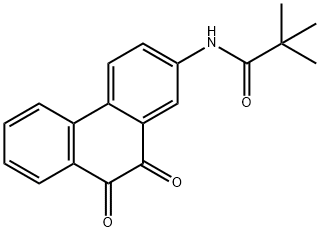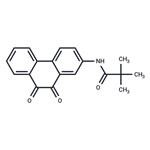SF1670 is used in the methods and compositions for treating tumor or cancer by administering to a subject a PTEN inhibitor and chemotherapeutic agents, immume dysregulation in patients with PTEN harmartoma tumor syndrome and analysis of FOXP3 regulatory T cells.
SF1670 has been used:
- To study the effect of microRNA-30a on PTEN (phosphatase and tensin homologue deleted on chromosome 10 ) expression regulation.
- To study the formation of autophagosomes, induced by EGF (Epidermal growth factor) - dependent PTEN expression.
- To study the role of PTEN in the regulation of autophagy induction in human normal endometrial stromal cells.
A cell-permeable, potent, selective, competitive, and reversible inhibitor of CD45 (IC50 = 200 nM using pNPP as the substrate, 3.8 μM for CD45 lck, >30 μM for PTP1B lck) that displays anti-proliferative properties. Also reported to potently block T-cell receptor-mediated proliferation (IC50 = 100 nM). Shown to be less cytotoxic (CC50 = 3.5 μM) than other 1,2-naphthalenedione analogs. The phenanthrenedione group does not function as a thiol oxidizing agent. One of the most potent inhibitor of phosphatase tensin homolog deleted on chromosome 10 (PTEN) that enhances PIP3 signaling in a variety of cells and improves the efficacy of granulocyte transfusion in murine models of neutropenia-related pneumonia.
sf1670 is a potent and specific inhibitor of pten [1].phosphatase and tensin homolog deleted on chromosome 10 (pten) is a phosphatidylinositol 3’-phosphatase that converts ptdins(3,4,5)p3 to phosphatidylinositol 4,5-bisphosphate. pten functions as a tumor suppressor that is mutated in many cancers [1].sf1670 is a potent and specific pten inhibitor. sf1670 bound to the active site of pten and increased ptdins(3,4,5)p3 signaling in neutrophils. in human neutrophils, sf1670 significantly increased akt phosphorylation stimulated by chemoattractant and specifically increased ptdins(3,4,5)p3 signaling. sf1670 efficiently increased akt phosphorylation at the concentration of 250nm. in mouse neutrophils, sf1670 also increased akt phosphorylation and ptdins(3,4,5)p3 signaling, which was mediated by the inhibition of pten activity. in neutrophils, sf1670 significantly increased reactive oxygen species (ros) production induced by fmlp. also, sf1670 increased neutrophil polarization induced by fmlp, which was necessary for the chemotactic migration and neutrophil recruitment to sites of inflammation [1].in a mouse neutropenia-associated bacterial pneumonia model, sf1670 increased the bacteria-killing capability and relieved inflammation-associated lung damage [1].
[1]. li y, prasad a, jia y, et al. pretreatment with phosphatase and tensin homolog deleted on chromosome 10 (pten) inhibitor sf1670 augments the efficacy of granulocyte transfusion in a clinically relevant mouse model. blood, 2011, 117(24): 6702-6713.

